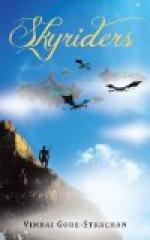“Yes, I guess I can,” said Johnny, still waiting for the blow to fall.
“Well, how many will the pasture feed, do yuh think? You can turn out one of the couple you’ve got.”
“Oh, there’s food enough for three, all right, I guess—”
“Well, all right—there’s a couple of good ones I’d like to have gentled down. Cold’s better, ay?”
“I—why, I guess so.” Johnny just said that from force of habit. His mind refused to react to a question which to him was meaningless. Johnny could not remember when he had last had a cold.
“Well, all right—to-morrow or next day, maybe. I’ll have the boys keep up the two I want rode regular. If everything’s running along smooth, you better come up and get ’em. And when they’re bridlewise and all, you can bring ’em in and get more. These boys won’t have time to get more ’n the rough edge off....”
When he had hung up the receiver, Johnny sat down on a box, took his jaws between his two capable palms and thought, staring fixedly at the floor while he did so.
It took him a full twenty minutes to settle two obvious facts comfortably in his brain, but he did it at last and crawled into his bed with a long sigh of thankfulness, though his conscience hovered dubiously over those facts like a hen that has hatched out goslings and doesn’t know what to do about them. One fact—the big, important one—was that Johnny still had his job, and that it looked as secure and permanent as any job can look in this uncertain world. The other fact—the little, teasingly mysterious one—was that Sudden evidently did not know of Johnny’s two-day absence from camp, and foolishly believed Johnny the victim of a cold.
But Johnny’s conscience was too much a boy’s resilient fear of consequences to cluck very long over what was, on the face of it, a piece of good luck. It permitted Johnny to sleep and to dream happily all night, and it did not pester him when he awoke at daylight.
Just because it became a habit with him, I shall tell you what was the first thing Johnny did after he crawled into his clothes. He went out hastily and saddled his horse and rode to the rock-faced bluff, turned into a niche and rode back to the farther end, then swung sharply to the left.
It was there. Dusty, desert-whipped, one wing drooping sharply at the end, the flat tire accentuating the tilt; with its tail perked sidewise like a fish frozen in the act of flipping; reared up on its landing gear with its little, radiatored nose crossed rakishly by the gravel-scarred propeller, that looked as though mice had nibbled the edges of its blades, it thrilled him as it had never thrilled him before.
It was his own, bought and paid for in money, and the sweat of long, toil-filled miles. It looked bigger in that niche than it had looked out on the desert with nothing but the immensity of earth and sky to measure it by. It looked bigger, more powerful—a mechanical miracle which still seemed more dream than reality. And it was his, absolutely the sole property of Johnny Jewel, who had retrieved it from a foreign country—his prize.




